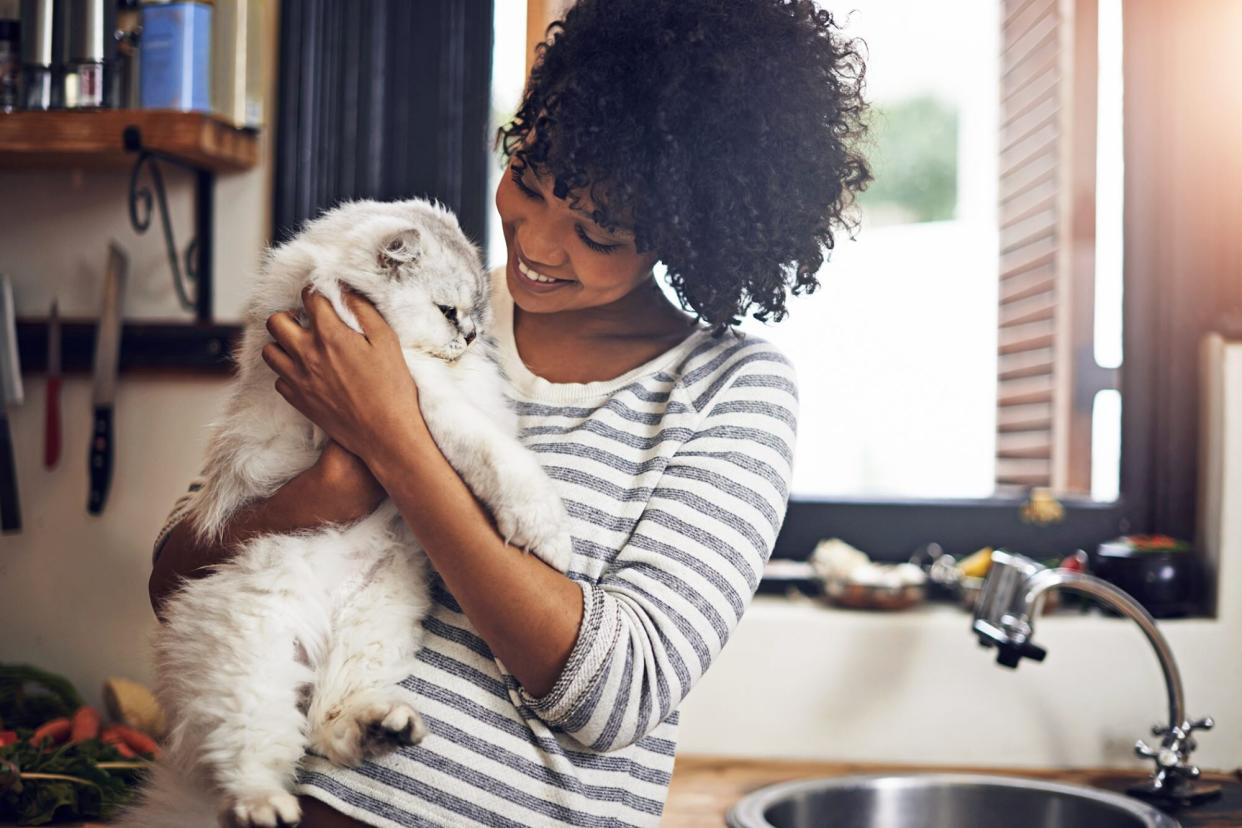Is Baking Soda Safe for Cats? Here's What You Need to Know

mapodile / Adobe Stock
TABLE OF CONTENTS
On This Page
What Is Baking Soda?
Is Baking Soda Toxic to Cats?
Signs and Symptoms of Baking Soda Toxicity
What To Do If Your Cat Eats Baking Soda
Safety of Common Uses
Baking soda: its uses extend far beyond baking. You might use it in cleaning the bathroom or removing pesky stains. And with a knack for eliminating foul odors, it's no surprise we've thought about using it to neutralize the smell of kitty litter encapsulating the bathroom. But is baking soda safe for cats? Let's dig in.
What Is Baking Soda?
Most homes likely have a box of baking soda sitting in their fridge or pantry to bake cookies at a moment's notice. Baking soda is actually the common household name for sodium bicarbonate, a naturally occurring mineral. According to the Nutrition Sciences Department at North Carolina State University, sodium bicarbonate is a base that reacts when it comes into contact with acids (for example: buttermilk, yogurt, or vinegar). When making baked goods, this process is called "chemical leavening" because the trapped carbon dioxide gas makes the dough or batter rise.
Sodium bicarbonate also works as a natural non-abrasive cleaner for sinks, tubs, and floors. Many people like to sprinkle baking soda on carpets, let it sit, and vacuum it up to get rid of any odors. With such a wide variety of uses, it's great to have a box or two on hand—so long as you understand the potential risks as a cat parent.
Is Baking Soda Toxic to Cats?
The short answer is yes, it can be. Due to their smaller body size, just 1–2 teaspoons of baking soda ingested can be dangerous for a cat. While it is not toxic in nature, cat parents should still use caution keeping baking soda around the house in accessible areas.
"With baking soda, I know that in large amounts it can be very harmful, but small quantities shouldn't be too harmful," says Tram Melgar, RVT, of PetNest Animal Hospital in Frisco, Texas. "Usually our feline friends are a little less prone to ingesting things they aren't supposed to. We see more dogs [eating baking soda] than cats."
Sodium bicarbonate has a slightly salty, bitter taste. Choosey cats might not show any interest in eating it, but the saltiness may be enough to attract a curious (or hungry) feline.
Signs and Symptoms of Baking Soda Toxicity
According to the American College of Veterinary Pharmacists, the signs of baking soda toxicity in cats include:
Upset stomach
Gas
Lethargy
Weakness
Muscle spasms
Shortness of breath
Rapid breathing
Disorientation
Seizures and/or tremors
Furthermore, sodium bicarbonate is a salt. Large quantities of sodium could cause electrolyte imbalances and potential health problems if left untreated.
What To Do If Your Cat Eats Baking Soda
If you know or suspect that your cat has eaten baking soda, try to determine how much was ingested and contact your veterinarian as soon as possible. Your cat should not experience toxic effects if they've only had a little dose, but gas or vomiting may still occur—watch your pet closely and be sure to provide plenty of fresh water.
You don't need to wait until your cat shows any toxicity signs to seek advice. The sooner you address any potential problems, the better.
Are These Common Uses of Baking Soda Safe for Cats?
In the Litter Box—It Depends
Known as a natural odor eliminator, kitty litter brands sometimes advertise baking soda on their packaging. If you're looking for a neutralizing agent, go with the litter that has baking soda already in it versus adding your own. "Unless they're brand new kittens under two months of age, they don't care to eat the litter anyways. Modern baking soda litters are less saturated so that it won't be harmful to [cats]," says Melgar.
RELATED: How to Clean Your Cat's Litter Box
On Your Cat's Bed—Not Safe
"I would not recommend it. Anything [cats] touch with their fur, you need to think about them licking themselves," says Melgar. "It's not ideal to use heavy perfume, cologne, detergent, [because] they're licking their fur, and they'll ingest it."
Deodorizing the Carpet—Safe
To eliminate odors, try sprinkling baking soda on your carpet and let it sit (with your kitty safely contained in a different area). Just be sure to vacuum thoroughly before letting your cat back in the room to avoid any transferring. Your cat may pick up trace amounts of baking soda on their paws but not enough to harm them.
Killing Fleas—Not Safe
Again, cats groom themselves, and using baking soda in their fur could result in them ingesting more than they can take. Always consult your veterinarian before any flea treatment.
RELATED: How to Get Rid of & Prevent Fleas on Cats
DIY Cat Toothpaste—Not Safe
Because of their small size, a cat cannot use baking soda as toothpaste in the same way that a larger dog might. They would likely ingest too much and get an upset stomach. Try other cat teeth-brushing methods instead.
Cat First Aid—Not Safe
"Not for a cat in first aid—we don't even recommend hydrogen peroxide. Cats are very sensitive," says Melgar. "If you have any accidents and can't get to the vet, warm water would be the best thing to treat with."
When in doubt, always talk to your vet before giving any DIY home remedies, and practice good judgment when it comes to baking soda and your cat.

